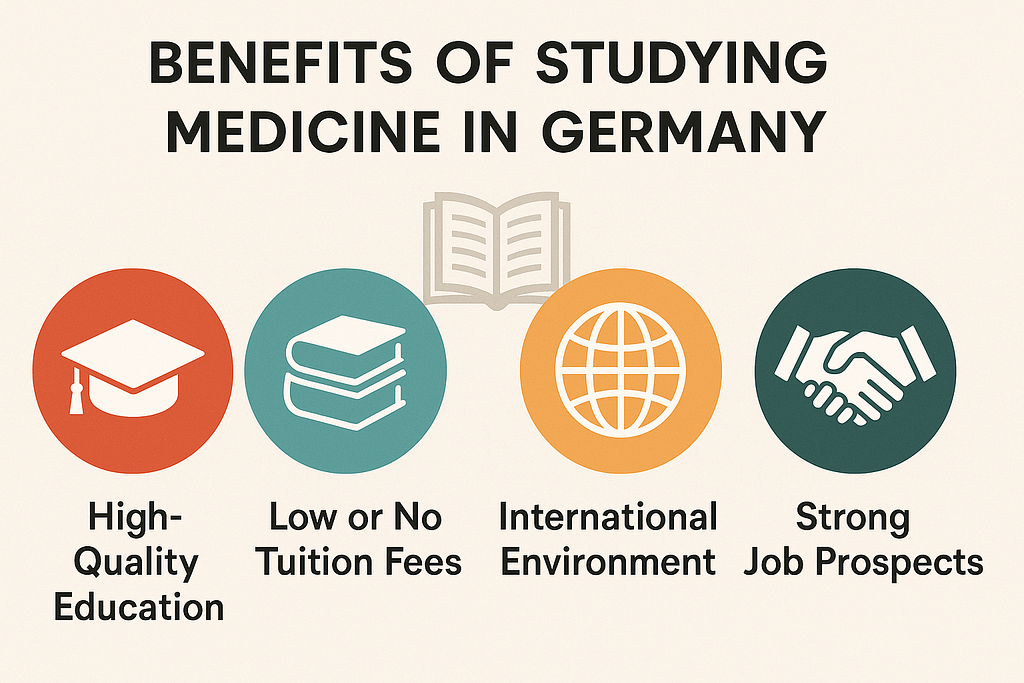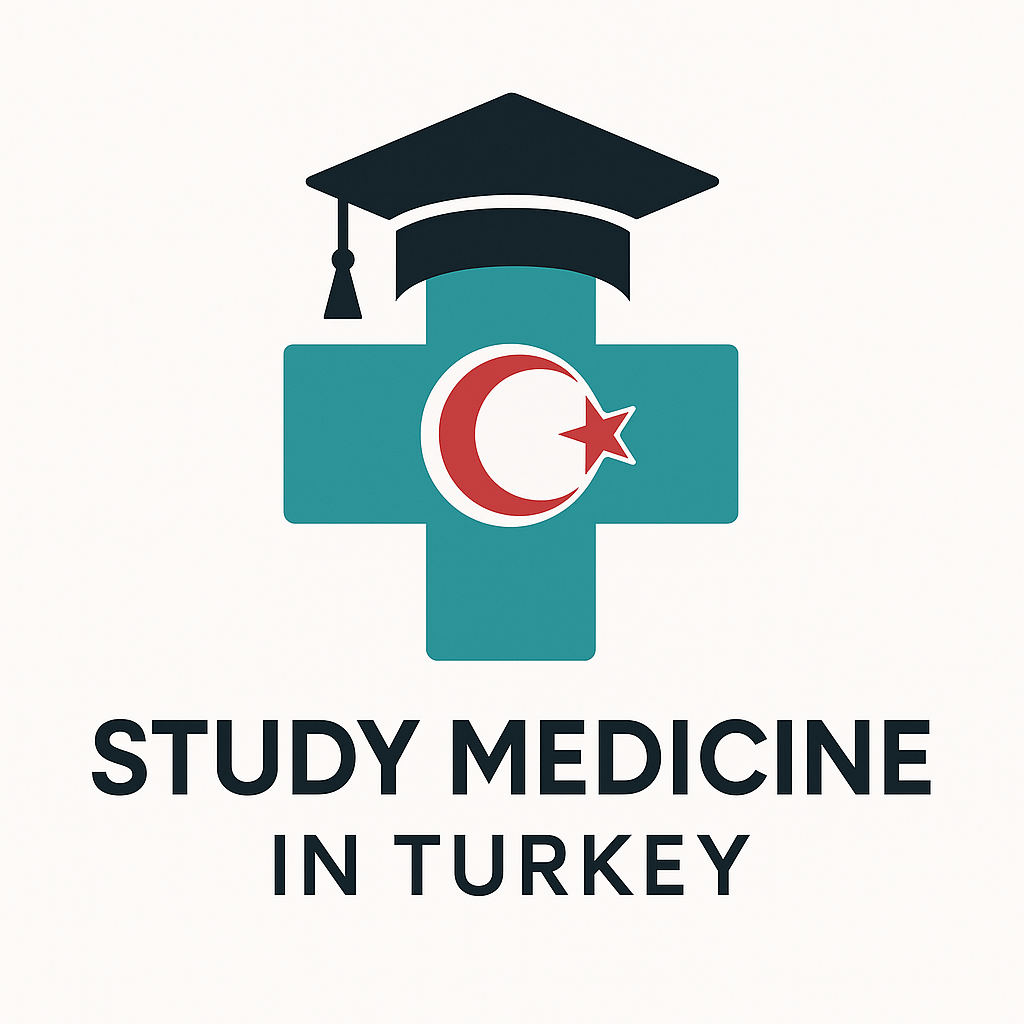Whether you’re from India, Nigeria, the United States, or anywhere in between, if you’ve been researching terms like “medical school Germany in English,” “study medicine in Germany for international students,” or “can you study medicine in Germany for free?” — this article is for you.
Contents
Germany has long held a reputation for academic excellence, especially in fields like engineering, medicine, and the sciences. But for many international students, one question looms large: Can I study medicine in Germany in English, without having to master the German language first?
The answer is more nuanced than a simple yes or no. While most public universities in Germany offer medicine programs exclusively in German, there are select opportunities to study medicine or related disciplines entirely in English — especially in private institutions or through interdisciplinary programs in the life sciences.
Why Choose Germany for Medical Studies?
Germany offers a combination of high academic standards, affordable education, and practical clinical training that few other countries can match. Here’s why thousands of international students consider Germany each year:

- Low to no tuition fees at public universities
- Global recognition of medical degrees from Germany
- Access to some of the most advanced hospitals and research centers in Europe
- A wide network of scholarship opportunities for foreign students
- Safe cities, modern infrastructure, and a strong healthcare system
These benefits are particularly appealing for students looking to gain a world-class education without incurring the kind of debt often associated with medical schools in the US or UK.
Are There Medical Schools in Germany Taught in English?
This is the core of our topic. While the majority of traditional “Medizin” programs in Germany are taught in German, some options exist for English-speaking students.
Full MD Programs in English
- UMCH (Universitätsmedizin Neumarkt am Mieresch Campus Hamburg):
Perhaps the most notable example, UMCH offers a full-fledged English-language MD program in Hamburg. Although the degree is awarded in collaboration with a Romanian medical university, students complete their coursework and clinical rotations in Germany. This program is tailored specifically for international students and taught entirely in English. - Medical University of Targu Mures (TUM) – Germany Campus:
This Romanian university has set up a branch in Germany (also operated under UMCH) and offers medical education in English that follows EU standards.
Bachelor and Master Programs in Medical Sciences

If you’re open to alternative paths, many German universities offer Bachelor’s or Master’s degrees in related fields, such as:
- Public Health
- Biomedical Sciences
- Health Sciences
- Molecular Medicine
These programs are taught in English and can be a stepping stone to medical school or a research career. For example:
- Jacobs University Bremen offers degrees in Biochemistry and Cell Biology taught in English.
- Heidelberg University and Charité – Universitätsmedizin Berlin offer English-taught postgraduate research programs.
Entry Requirements for Studying Medicine in Germany (English and German-taught)
General Criteria for English-taught Medical Programs
For English-language MD programs or related life science degrees, you’ll usually need:
- A high school diploma or equivalent with strong performance in sciences (especially biology and chemistry)
- Proof of English proficiency, typically IELTS (6.5+) or TOEFL (minimum 90 iBT)
- Motivation letter and CV
- Possible interview or entrance examination
Additional Requirements for German-taught Programs
If you’re aiming for public universities where the curriculum is in German, be prepared for:
- C1-level German proficiency (e.g., TestDaF or DSH exam)
- Recognition of your foreign secondary school diploma via the Anabin database or the Studienkolleg route
- Completion of the TestAS aptitude test, which some universities require
For international students, especially non-EU applicants, the admissions process is competitive. Medicine is a highly sought-after subject in Germany, with limited seats for non-EU students.
How Much Does It Cost to Study Medicine in Germany?
Public Universities (Mostly German-taught)
- Tuition fees: Free of charge
- Semester contribution: €250 to €350 per semester
- Living expenses: Estimated at €850 to €1,200 per month
Studying at a public university means you only pay administrative fees. However, you’ll need strong German language skills to take advantage of this.
Private Universities (English-taught)
- Tuition fees: Between €12,000 and €25,000 per year
- For instance, UMCH charges approximately €25,000 annually for its MD program.
Though these fees are significantly higher than public options, they are still more affordable than many international medical schools.
Can You Study Medicine in Germany for Free?
Yes — but only at public universities and only if you study in German. International students, regardless of origin, pay zero tuition fees at most public institutions in Germany. This is part of Germany’s commitment to accessible education. Please note that there are tuition fees payed by every student regardless of their heritage or faculty. These var among universities. In Heidelberg the fees are around 170 Euros every Semester, meaning this fee needs to be paid to the university every six month. Even though they are different from university to university the differences are so low that they are neglected to be referred to.
However, English-taught MD programs are offered mainly by private institutions, which do charge tuition.
That said, scholarships can help reduce your financial burden.
Scholarships for Medical Students in Germany
Here are some of the most relevant scholarship opportunities for international medical students:
- DAAD (German Academic Exchange Service):
Offers a wide range of merit-based scholarships for both undergraduate and graduate studies. Not all are applicable to medicine, but many cover related fields such as public health or medical research. - Deutschlandstipendium:
A merit-based program that provides €300/month to high-achieving students. Open to international students enrolled in German universities. - University-specific scholarships:
Some private universities, like UMCH, offer merit-based or need-based financial aid.
Applicants are advised to prepare scholarship materials (CV, letter of motivation, reference letters) early — ideally 6 to 12 months before the start of their program.
Learning Medical German: Why It Still Matters
Even if your program is taught in English, the clinical environment in Germany operates primarily in German. From hospital internships to patient communication, German language skills become essential by the third or fourth year of study.
To prepare:
- Enroll in a language course before or during your studies
- Consider taking specialized Medical German courses, which focus on terminology and patient interaction
- Apps like Babbel and platforms like Goethe-Institut offer medical German certifications
Some universities even offer language support as part of the curriculum.
Student Visa and Residence Permit
To study medicine in Germany as a non-EU citizen, you’ll need:
- A university admission letter
- Proof of financial resources — typically through a blocked account of €11,208/year
- Health insurance valid in Germany
- Language certificate (English or German)
- Valid passport and visa application
The process usually takes 6 to 12 weeks, so apply early.
Career Opportunities After Graduation
After earning a medical degree in Germany, students can:
- Apply for medical licensing (Approbation) to work in Germany or the EU
- Pursue postgraduate training or specialization in hospitals across Europe
- Enter medical research jobs in Germany (in universities, biotech, or pharma)
- Continue with academic careers, especially if they hold a Master’s or PhD in a related medical science
Final Thoughts: Is Germany the Right Place for Your Medical Education?
Studying at a medical school in Germany in English is possible, but it requires careful planning and realistic expectations. If you’re looking for a free medical degree and are willing to learn German, public universities offer world-class education at virtually no cost.
If your priority is an English-only curriculum, private institutions like UMCH are your best bet — though they come at a higher price.
Alternatives such as medical science degrees, biomedical research, and public health programs can also provide rewarding careers in medicine and healthcare.
Recommended Next Steps
Entering a medical school in Germany in Englisch is rough not only due to the less amount of universities offering this, but also learning a completely new language is rough on its own.
- Research universities thoroughly. Visit websites, attend virtual info sessions, and contact admissions teams directly.
- Evaluate your language readiness. Decide whether you’re ready to learn German or prefer to stick with English-language options.
- Compare costs and plan financing. Consider both tuition and living expenses.
- Start early. Many programs have strict deadlines and competitive admissions.
- Use trusted resources, such as:
Join the Conversation
If you’ve gone through the process of applying to study medicine in Germany, we’d love to hear your story. Share your experiences or questions in the comments below. If this guide helped you, consider forwarding it to a friend who’s exploring their options.
You’re one step closer to enter a medical school in Germany in English and to wearing that white coat — in Germany.
To read more about the various places considered for medical study by international students have a look at one of our other blogs >> Where Abroad to Study Medicine?

Hey there,
As the admin of studyingmedicineinturkey.com, I bring firsthand experience as a foreign medical student studying in Ankara, Turkey. My journey has provided me with valuable insights into the challenges and opportunities that international students encounter while pursuing their medical education in Turkey.
Best of Luck:)


